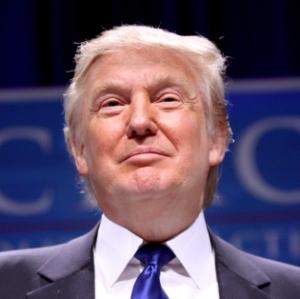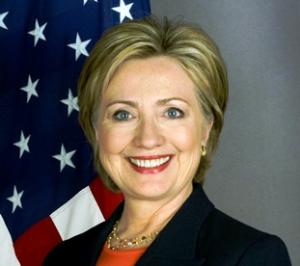(This article was written prior to the election.)
One means of judging the competing presidential candidates is to examine their actual policy prescriptions for dealing with serious issues facing the country. When it comes to drug policy, the contrasts between Hillary Clinton and Donald Trump couldn't be more telling.

Guess which is which.
Hillary Clinton has offered a detailed $10 billion plan to deal with what she called the "quiet epidemic" of opioid addiction. Donald Trump's plan consists largely of "build the wall."
That was the centerpiece of his October 15 speech in New Hampshire where he offered his clearest drug policy prescriptions yet (though it was overshadowed by his weird demand that Hillary Clinton undergo a drug test). To be fair, since then, Trump has also called for expanding law enforcement and treatment programs, but he has offered no specifics or cost estimates.
And the centerpiece of his approach remains interdiction, which dovetails nicely with his nativist immigration positions.

Trump did not address the failure of 40 years of ever-increasing border security and interdiction policies to stop the flow of drugs up until now, nor did he explain what would prevent a 50-foot wall from being met with a 51-foot ladder.
Trump's drug policy also takes aim at a favorite target of conservatives: so-called sanctuary cities, where local officials refuse to cooperate in harsh federal deportation policies.
"We are also going to put an end to sanctuary cities, which refuse to turn over illegal immigrant drug traffickers for deportation," he said. "We will dismantle the illegal immigrant cartels and violent gangs, and we will send them swiftly out of our country."
In contrast, Clinton's detailed proposal calls for increased federal spending for prevention, treatment and recovery, first responders, prescribers, and criminal justice reform. The Clinton plan would send $7.5 billion to the states over 10 years, matching every dollar they spend on such programs with four federal dollars. Another $2.5 billion would be designated for the federal Substance Abuse Prevention and Treatment Block Grant program.

Instead of a criminal justice crackdown, Clinton vows that her attorney general will issue guidance to the states urging them to emphasize treatment over incarceration for low-level drug offenders. She also supports alternatives to incarceration such as drug courts (as does Trump). But unlike Trump, Clinton makes no call for increased penalties for drug offenders.
Trump provides lip service to prevention, treatment and recovery, but his rhetorical emphasis illuminates his drug policy priorities: more walls, more law enforcement, more drug war prisoners.
There is one area of drug policy where both candidates are largely in agreement, and that is marijuana policy. Both Clinton and Trump have embraced medical marijuana, both say they are inclined to let the states experiment with legalization, but neither has called for marijuana legalization or the repeal of federal pot prohibition.
If Clinton's drug policies can be said to be a continuation of Obama's, Trump's drug policies are more similar to a return to Nixon's.
(This article was prepared by StoptheDrugWar.org"s lobbying arm, the Drug Reform Coordination Network, which also pays the cost of maintaining this web site. DRCNet Foundation takes no positions on candidates for public office, in compliance with section 501(c)(3) of the Internal Revenue Code, and does not pay for reporting that could be interpreted or misinterpreted as doing so.)
This work by StoptheDrugWar.org is licensed under Creative Commons Attribution-ShareAlike 4.0 International
Add new comment